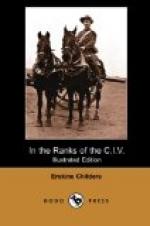July 11.—Reveille at 6.30. Stables, grazing, exercise, and more stables, till 1.30, and grazing again in the afternoon. Sat up late at night over embers of cook’s fire, talking to a Munster sergeant about the last two days’ fighting and other experiences of his. They had thirty-two casualties on the second day, including four officers wounded. All sorts of rumours to-day: that we stop a month on this hill; that we go to Capetown on Friday; that we march to Harrismith and Durban in a few days, etc., etc.
July 12.—At breakfast, mealy porridge was served out with the coffee. It is eatable, but not pleasant without sugar.
Williams and I got leave to spend the morning out, and walked to Bethlehem over the veldt. A rather nice little town, but all the stores shut, and looking like a dead place. It was full of troops. Some stores had sentries over them, for there had been a great deal of looting. We hammered at a store door, and at last a man came out and said he had nothing to sell. However, he gave us leave to look round, which we did with an exhaustive scrutiny which amused him. At first there seemed to be nothing but linseed meal and mouth-organs, but by ferreting round, climbing to shelves, and opening countless drawers, we discovered some mealy flour, and reproached him for his insincerity. He protested that it was all he had to live on, but at last consented to sell us some, and some mixed spices, the only other eatable he had, besides a knife and fork, braces and sponges. Then we tried another store. A crusty, suspicious old fellow let us grudgingly in, locked the door, and made the same protests. We were just going when I descried some bottles on a distant shelf. He sourly brought them down. They were Mellin’s Food for Infants, and we bought six at half a crown each; also some mixed herbs, and essence of vanilla. Then we made a house-to-house visitation, but only got some milk from an Englishwoman, who was so full of stories of Boer rapacity that she forgot our wants, and stood, cup in hand, complaining about eight ponies they had taken, while we were deaf and thirsty. The whole town had an English appearance. They all abused De Wet. No fresh supplies had come in for nine months, and the whole place was stripped. On the whole, we thought we had done pretty well, as we had half a sack of things, and another one full of fuel laboriously collected on the way back.
Rumours in the town were rife. All agreed we could do nothing till a supply-convoy comes in, now expected from Kroonstadt. We are fifty-four miles, across mountains, from Harrismith on the east, and seventy or eighty from Kroonstadt on the west. All supplies from the latter must come by ox-waggons over dozens of bad drifts, with raiding Boers about, and it is easy to see how an army might be starved before it knew it. We are very short now, I believe. It seems De Wet is ten miles off in the mountains,




